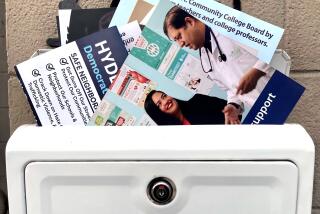Opt-In Method Brings More Marketers Back to E-Mail Medium
- Share via
SAN FRANCISCO — No one likes “spam” e-mail flooding into their online mailboxes, but another form of e-mail advertising is proving to be effective--and it’s even welcomed by those targeted to receive it.
While the Internet advertising industry debates the effectiveness of banner advertisements, the trackability and proven effectiveness of opt-in e-mail marketing is quickly winning converts.
E-mail marketing first gained attention a few years ago when consumers complained of unsolicited e-mail advertisements, or spam, that inundated their mailboxes. Since then, many marketers have shied away from e-mail campaigns for fear of being accused of spamming.
But opt-in e-mail marketing, which sends messages to customers who voluntarily agree to receive them, is drawing marketers back to the medium.
According to a March study by technology research firm Forrester Research of Cambridge, Mass., the majority of companies that use opt-in e-mail in their marketing strategy do so through home-grown tools with very little personalization. Even so, the average response rate is 18%, significantly higher than the average click-through rate of 0.65% for banner ads.
Compared with the average $35 cost-per-thousand rate of banners, e-mail costs only pennies per message. Compared with some of the traditional banner advertising, “it’s certainly the best bang for the buck,” said John Feidner, general manager at Tower Records (https://www.towerrecords.com).
The music retail store sends out general and personalized genre-specific mailings at least once a month to registered customers. Feidner said its promotional and informational messages have resulted in a conversion rate exceeding 10%.
Although companies use e-mail in various stages of the marketing cycle, from the initial customer acquisition stage to the retention stage, Forrester analyst Paul Sonderegger said e-mail messages aimed at retaining existing customers are most effective.
“In a prospecting relationship, you don’t know anything about the people you’re prospecting,” he said. “Even if a potential customer had requested advertisements in particular interest areas, those communications are still not as intimate [as messages to existing customers] and therefore not as powerful,” he said.
On the other hand, “In retention, you do know something,” Sonderegger said. “That’s where e-mail marketing is most powerful--communicating with people according to their interests and getting more and more attuned to their interests.”
Recognizing this fact, e-mail outsourcing firms, such as industry leader Digital Impact, focus their business on helping clients with their customer retention strategy through e-mail campaigns designed to build lifetime relationships with their customers.
For example, San Mateo, Calif.-based Digital Impact uses customer information from its clients to send out personalized promotional and service e-mails in HTML or plain text form, depending on the receivers’ technology capability.
Recently, it helped Virtual Vineyards (https://www.virtualvin.com), an online wine retailer, send out personalized e-mail by using the ZIP Codes of its customers to discern whether their home states allowed interstate alcohol shipments. Customers who lived in states that allowed shipments received e-mails with wine promotions. Customers who did not received e-mails with food and gourmet promotions.
“Due to technology that allows almost 100% trackability, personalization can only increase as clients learn more and more about their customers and campaigns that work,” said William Park, president of Digital Impact. “We’ve sent out 35,000 completely unique offers and promotions based on prior preferences and stated preferences.”
Sonderegger said this kind of sophisticated level of e-mail marketing will become increasingly important as more marketers start using e-mail as a tool. “Because response rates are great, companies will continue to [use e-mail], and companies who don’t [yet use it] will.”
In order to continue being effective, companies will have to grab their customers’ attention through attractively designed e-mail messages and a high level of personalization, he said.
Because true personalization requires powerful servers and a large marketing department with up-to-date expertise in database marketing, data mining, copy writing and technology, Sonderegger expects more companies to outsource the execution of their e-mail campaigns.




